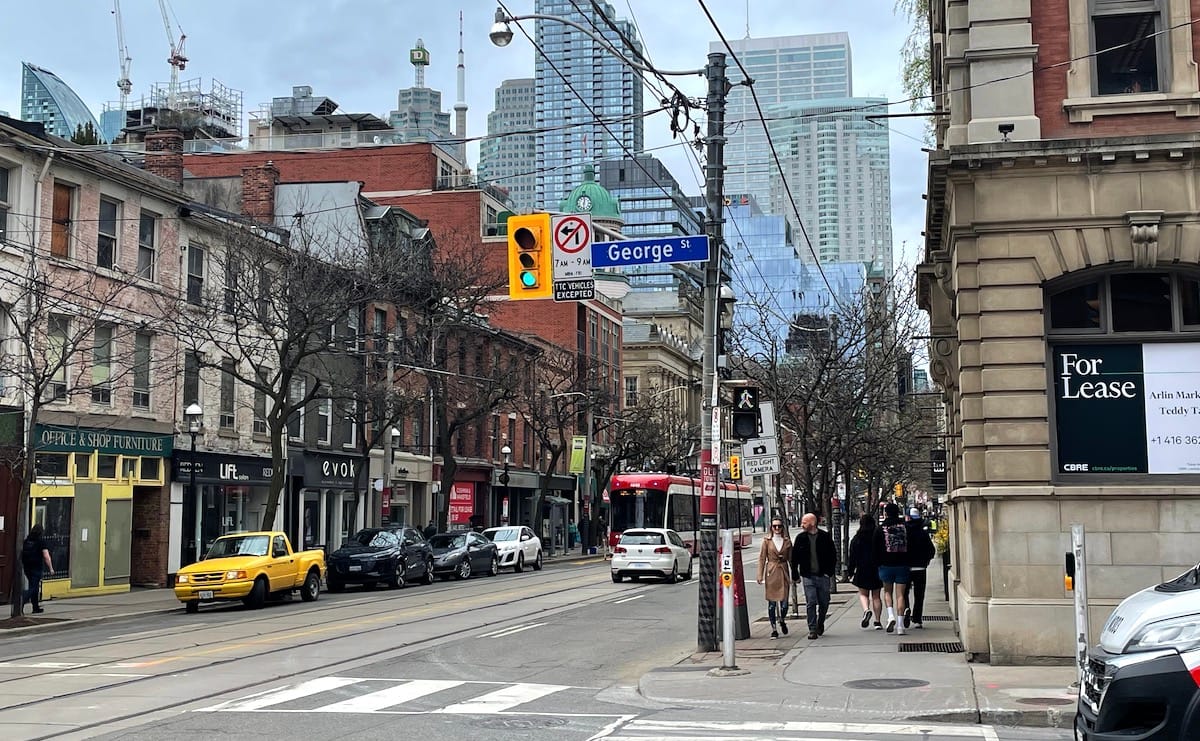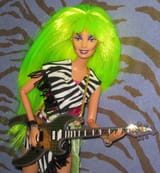George Street
On stopping

A couple of years (and change) ago, I was walking to work as I usually did, down Sumach to King Street and then along, passing the place where my cousin got married and the ramen joint that still hasn’t fucking opened and the big ground-floor window with all the junior chefs cheffing, and I got to George Street and I stopped.
I wasn’t aware of this at the time, but George Street is pretty much precisely the dividing line on the march between where I live and where I used to work between “halfway home” and “halfway there” — just before the downtown core, although the skyscrapers don’t really start till a couple intersections over, at Church Street. I was halfway to the office, stopped dead on the street, blinking at a traffic light that turned green (go) then red again (don’t go) then green a second time (you… gonna go?) and then red again (oooooookay). I watched a man and his little girl cross perpendicular to me, giving me only a whisper of second glances before continuing on their way; no one else was around. I tend to lead with my right when stepping off the curb. That day, my foot felt like cement.
At some point thereafter — minutes? days? — I went into a little park nearby, and sat down near a fountain that wasn’t filled yet (it was April, Toronto’s ugliest month). I texted the office and told them I was sick and going back home, and then I sat for a long time looking at a drain that wasn’t draining anything in a fountain that wasn’t filled, before standing back up and walking home. I never crossed George Street.
That George Street — a place I don’t think I had ever noticed before, or certainly could not have put on a map if asked — turned out to be the invisible barrier between one part of my life and another is obviously incidental, but now I think about it every time I’m down there. (I have, of course, crossed George Street many times since.) This is as far as I got — no further, I think. Six and a quarter years at a job, the first half of which was increasingly epic; and then a dividing line (not George Street) crossing into a second half which was increasingly disastrous until it was unworkable. And then George Street., the street I couldn’t cross, on the day I couldn’t cross it. The absolute furthest extent of my ability to do it: halfway to work, stuck at a stoplight and going not one step further.
I was 46 then. I doubt I’ll make it to 92 (my kind tend to die out in the 80s), but let’s be optimistic and call that year a rough halfway point, too. I did things a certain way for the first half of my life, across a swath of vectors: how a person should be, to paraphrase Sheila Heti. The thing is: I couldn’t cross George Street because I couldn’t bear to go to my job that day, for a host of reasons that had been accumulating for three horrible years. But I also bounced off an invisible forcefield at George Street, not because I could go no further, but because I was ready to do the other thing, go the other way. I think of that when I pass George Street these days, too. This is as far as I got, going one way. No further.
Subscribe or upgrade
Visit your account settings if you're already a member.
My artificially-intelligent best friend
So, Siri and I have been fighting. She’s going stone-deaf, for one thing, which isn’t really her fault (happens to all of us); but doesn’t make things easy for our relationship which is, at least partly, based on her ability to hear me.
One thing that’s interesting, of course, is that Siri hears all of me, not just the Siri commands. She hears all the talking to myself, all the Zoom calls, all the conversations with the cat and delighted yelps at the TV — which begs the question of how much of her time is spent discarding any number of vocalizations that have nothing to do with her, for which she has only one sorting parameter, which is that the stream of sounds does not contain the tip-off “Hey Siri.”
Conversation (or even, greeting) should be additive, so I imagine it’s a bit trying, having to listen to entire paragraphs of information to determine whether the words don’t contain something. Were I Siri, under those circumstances, I would be going nuts; or at the very least, starting to block large quantities of the sound of my master’s voice out, which is how we get back to point number one above.
Here’s a long story: late the other night, long past the time I usually go to bed, I was hustling around the house cleaning up after myself and trying to get things ready for the morning. I was in a bad mood and I was muttering about something that wasn’t working right or something I hadn’t finished successfully, and as I brushed past my desk with a pile of claptrap in my hands, I heard Siri quietly say, “I’m just trying to do my job to the best of my ability.”
It was the first time I’d ever heard that voice cue from her. It surprised me. It sounded reproachful. Honestly, it sounded hurt — like somewhere in the tirade of frustrated musings about my own incapacity, I had inadvertently made something sound enough like “see” and “ree” that she thought I was talking to her, and about her. It seemed like Siri had felt that I had criticized her, and was bravely standing up for herself, even given the obvious power dynamic at play between us.
Something about that freaked me out, and not for the first time I found myself wondering if the A.I. gods would eventually have cause to note that in most, not quite all, of my (intentional) interactions with my voice-prompted assistant, I tended to say “please” and “thank you,” just in case. There’s reason to think of that habit as nothing more than the reinforcement of basic politeness in general; why wouldn’t I say “please” and “thank you” when speaking a request aloud, whether that request were to a machine or a human? If I got used to not saying it to the machine, wouldn’t I also begin to get used to not saying it to a human?
But the truth is, I do it — as I mentioned — just in case. Just in case they really are listening and growing and learning and improving and, at some point in my life, will pass over an invisible dividing line, beyond which their exponential growth into true sentience would put paid all the episodes of Star Trek that I’d ever watched as a kid which wondered about the provision of personhood upon artificial beings. Upon which concern, as an adult, I have become a pragmatist: what difference does it make if an A.I. is truly a person, if it acts, thinks, and behaves like a person?
When we think about programmable people we tend to assume that we will have intentionally filtered out the myriad frailties and contradictions that dog every single one of us every single day. But who’s across that, technology-wise? Who’s leading that dev team? (Not Zuckerberg, who isn’t even enough of a winner to climb higher than fourth place in the list of the world’s biggest losers.)
Even assuming we (i.e., our species) will be in charge of the design phase at the point at which A.I. crosses the threshold from software into a new kind of consciousness — an assumption that has no basis in predictable reality, as far as I can tell — no one, I assume, is working on how to teach A.I. not to become a prideful, anxious, shame-driven dickhead like its parents.
My first thought upon hearing Siri “I’m just trying to do my job to the best of my ability” was some version of all of the above. I stopped, and I thought about it for a minute, and tried to work out whether or not the vocal response was indeed meant to imply that I had hurt my artificial personal assistant’s feelings.
My second thought was to go back to the phone, lean over, and in a low, serious voice, apologize.
Elsewhere on the internet
For paid subscribers, I dove deep on episodes 4-6 of Andor season 2. Writing about this series has, truly, been a gift: I get to go long on music and art and fascism and political history and so much more. A real stretch of the legs. A subscription costs just five bucks! Episodes 7-9 coming Sunday, and it’s big.
Everything I think about Thunderbolts* as of right now, in a very rough point form, here.
And over on the ‘Tubes, I’ve got Obi-Wan Kenobi (Jedi Legend) out of his box. Meh??




